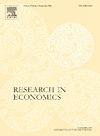地缘政治危机与经济政策不确定性:来自美国的时间序列分析
IF 1.2
Q3 ECONOMICS
引用次数: 0
摘要
经济政策不确定性(EPU)与各种经济和金融结果相关。然而,其来源仍未得到充分研究。本文利用1985-2019年美国的数据,分析了地缘政治危机对EPU的长期和短期影响。我们提出了一个时间序列分析,特别是自回归分布滞后模型,每月数据集与EPU和地缘政治危机的指标。我们发现地缘政治危机对EPU的影响是有条件的和暂时的,这意味着它只有在美国直接参与或积极参与并随着时间的推移而具体化时才显着。本文章由计算机程序翻译,如有差异,请以英文原文为准。
“Geopolitical crises and economic policy uncertainty: Time series analysis from the United States”
Economic policy uncertainty (EPU) is empirically associated with a variety of economic and financial outcomes. However, its sources remain understudied. In this study, we analyze the long-run and short-run impacts of geopolitical crises on EPU by using evidence from the United States (U.S.) for the period of 1985-2019. We present a time series analysis, specifically the autoregressive distributive lag model, on a monthly dataset with the indicators of EPU and geopolitical crises. We find that the impact of geopolitical crises on EPU is conditional and temporal, meaning that it is significant only if the U.S. is directly involved or an active participant in them and materializes over time.
求助全文
通过发布文献求助,成功后即可免费获取论文全文。
去求助
来源期刊

Research in Economics
ECONOMICS-
CiteScore
1.40
自引率
0.00%
发文量
37
审稿时长
89 days
期刊介绍:
Established in 1947, Research in Economics is one of the oldest general-interest economics journals in the world and the main one among those based in Italy. The purpose of the journal is to select original theoretical and empirical articles that will have high impact on the debate in the social sciences; since 1947, it has published important research contributions on a wide range of topics. A summary of our editorial policy is this: the editors make a preliminary assessment of whether the results of a paper, if correct, are worth publishing. If so one of the associate editors reviews the paper: from the reviewer we expect to learn if the paper is understandable and coherent and - within reasonable bounds - the results are correct. We believe that long lags in publication and multiple demands for revision simply slow scientific progress. Our goal is to provide you a definitive answer within one month of submission. We give the editors one week to judge the overall contribution and if acceptable send your paper to an associate editor. We expect the associate editor to provide a more detailed evaluation within three weeks so that the editors can make a final decision before the month expires. In the (rare) case of a revision we allow four months and in the case of conditional acceptance we allow two months to submit the final version. In both cases we expect a cover letter explaining how you met the requirements. For conditional acceptance the editors will verify that the requirements were met. In the case of revision the original associate editor will do so. If the revision cannot be at least conditionally accepted it is rejected: there is no second revision.
 求助内容:
求助内容: 应助结果提醒方式:
应助结果提醒方式:


